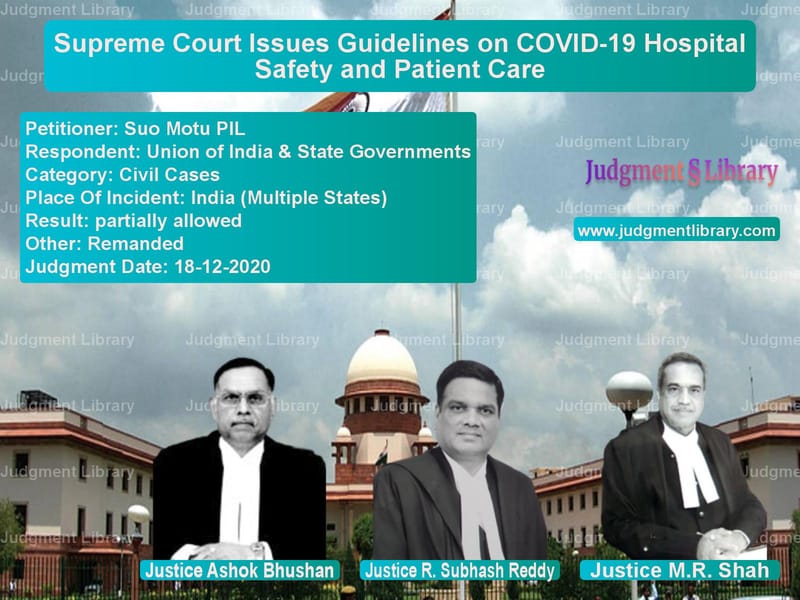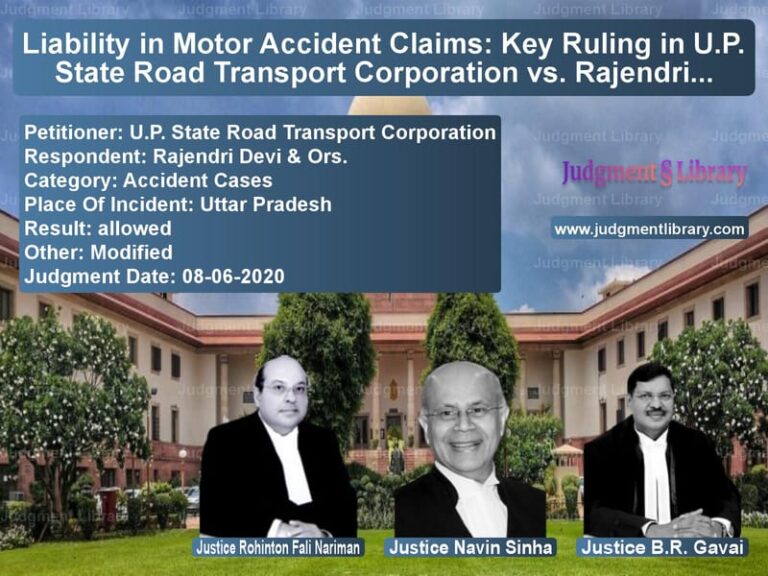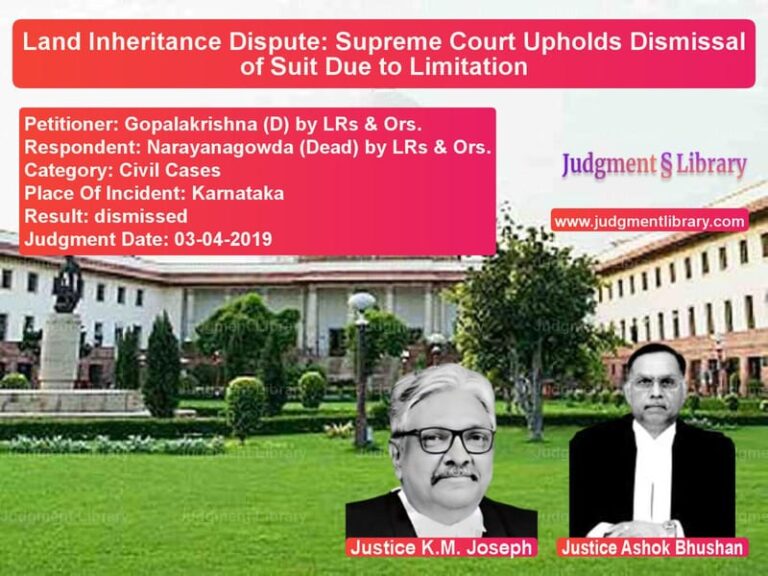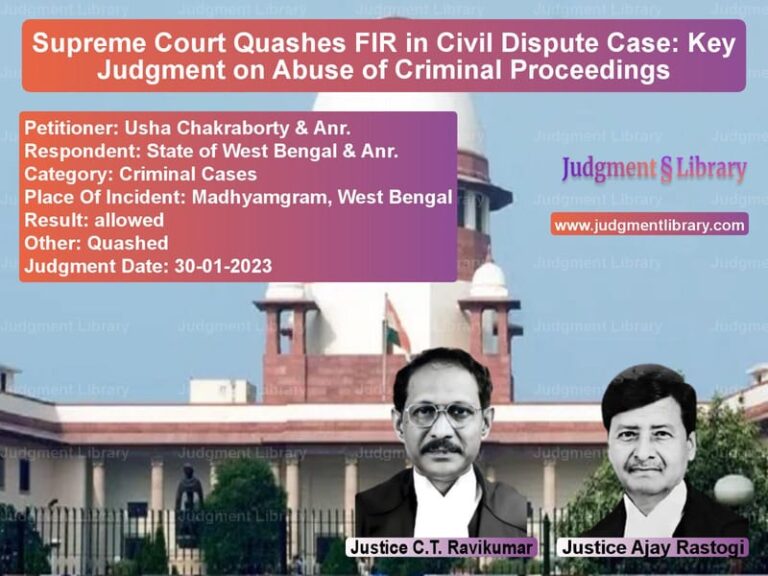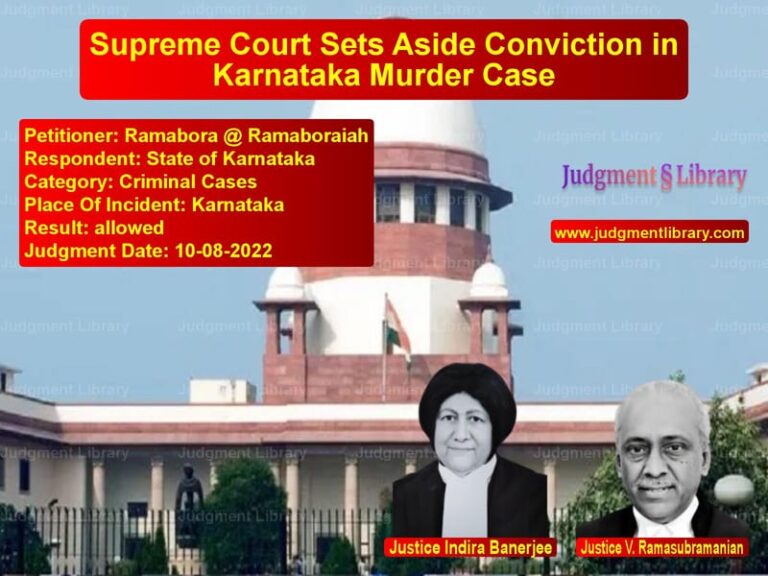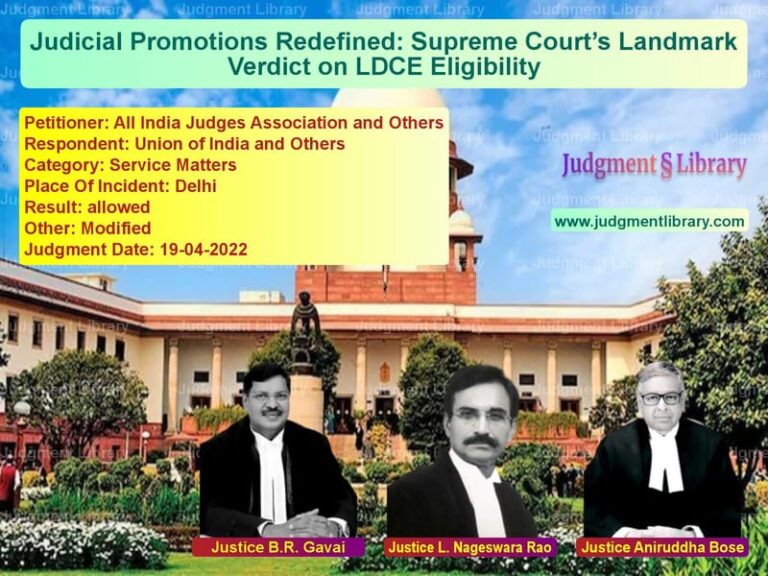Supreme Court Issues Guidelines on COVID-19 Hospital Safety and Patient Care
The case In Re: The Proper Treatment of COVID-19 Patients and Dignified Handling of Dead Bodies in Hospitals was a public interest litigation (PIL) initiated suo motu by the Supreme Court of India. The Court took cognizance of the tragic fire incidents in COVID-19 hospitals across various states, the lack of proper treatment of patients, and the undignified handling of deceased bodies. The case addressed crucial issues related to the healthcare system’s preparedness in handling the pandemic.
On November 27, 2020, the Supreme Court issued notices to the central and state governments, directing them to file affidavits detailing the safety measures adopted in hospitals and nursing homes. The case gained significance after a devastating fire at a COVID-19 hospital in Rajkot, Gujarat, where several patients lost their lives. Similar incidents had occurred earlier in Ahmedabad and other cities.
Background of the Case
- The Supreme Court took suo motu cognizance of fire safety lapses in COVID-19 hospitals.
- The case was initiated after the tragic fire incident at Shrey Hospital in Ahmedabad and another at Uday Shivanand Hospital in Rajkot.
- The Court sought reports from all states and Union Territories regarding fire safety norms and compliance.
- The case also examined the treatment of patients and the financial burden imposed by private hospitals.
Solicitor General’s Submission
The Solicitor General of India, Shri Tushar Mehta, submitted:
- The Union government had issued an advisory on November 28, 2020, directing all states to prevent fire incidents in hospitals.
- State governments were instructed to conduct fire audits in hospitals and nursing homes.
- The Ministry of Home Affairs circulated a Model Bill on Maintenance of Fire and Emergency Services, 2019 to be adopted by states.
- The central government was coordinating with states to ensure safety compliance.
State Governments’ Reports
Various states and Union Territories submitted affidavits detailing their fire safety measures:
- The Gujarat government appointed Justice D.A. Mehta to investigate the hospital fires.
- Several states conducted fire audits and reported shortcomings in hospital safety.
- The states updated their local building by-laws in line with the Model Bill on Fire Safety.
Supreme Court’s Observations
The Supreme Court, in its ruling delivered by Justices Ashok Bhushan, R. Subhash Reddy, and M.R. Shah, made several key observations:
1. Appointment of Nodal Officers
The Court directed all states and Union Territories to appoint a nodal officer for each COVID-19 hospital, responsible for ensuring fire safety compliance.
2. Monthly Fire Audits
Each state was ordered to constitute district-level committees to conduct fire audits of COVID-19 hospitals every month. Reports were to be submitted to state governments for corrective action.
3. Fire Safety Clearances
Hospitals operating without a valid fire No Objection Certificate (NOC) were directed to immediately obtain one. The Court emphasized strict enforcement of fire safety laws.
4. Affordability of COVID-19 Treatment
The Court expressed concern over the high cost of treatment in private hospitals, stating:
“Right to health is a fundamental right under Article 21 of the Constitution. The State must ensure affordable treatment for all citizens.”
It suggested imposing a cap on private hospital charges under the Disaster Management Act.
5. Strict Implementation of COVID-19 Guidelines
The Court observed that despite guidelines, the pandemic had spread due to lax enforcement. It directed:
- Strict penalties for violating COVID-19 guidelines.
- Deployment of additional police personnel at crowded places.
- Strict monitoring of public gatherings.
- Transparency in COVID-19 testing data.
6. Political Gatherings and Elections
The Court addressed concerns over large gatherings during elections. It directed state governments to enforce Election Commission guidelines strictly:
- Public rallies must follow social distancing norms.
- Maximum attendees at political events should be regulated.
- Non-compliance should result in penalties under the Disaster Management Act, 2005.
7. Weekend and Night Curfews
The Court suggested imposing weekend and night curfews in areas with high infection rates to break the chain of transmission.
8. Protection of Healthcare Workers
The Court acknowledged the mental and physical exhaustion of healthcare workers and directed the government to provide them with intermittent rest.
Final Judgment
The Supreme Court:
- Issued strict directives to state governments regarding fire safety, COVID-19 treatment, and guideline enforcement.
- Ordered all states and the central government to file compliance reports within four weeks.
- Directed state governments to ensure that hospitals followed safety and health protocols.
Implications of the Judgment
This ruling has significant implications:
- Ensures better fire safety measures in hospitals.
- Mandates affordability of COVID-19 treatment.
- Strengthens enforcement of pandemic guidelines.
- Increases accountability of private hospitals.
- Protects the rights of patients and healthcare workers.
The judgment reaffirmed that the right to health is a fundamental right and that government authorities must ensure safe and affordable healthcare facilities for all citizens.
Petitioner Name: Suo Motu PIL.Respondent Name: Union of India & State Governments.Judgment By: Justice Ashok Bhushan, Justice R. Subhash Reddy, Justice M.R. Shah.Place Of Incident: India (Multiple States).Judgment Date: 18-12-2020.
Don’t miss out on the full details! Download the complete judgment in PDF format below and gain valuable insights instantly!
Download Judgment: Suo Motu PIL vs Union of India & Sta Supreme Court of India Judgment Dated 18-12-2020.pdf
Direct Downlaod Judgment: Direct downlaod this Judgment
See all petitions in Public Interest Litigation
See all petitions in Fundamental Rights
See all petitions in Emergency Provisions
See all petitions in Judgment by Ashok Bhushan
See all petitions in Judgment by R. Subhash Reddy
See all petitions in Judgment by Mukeshkumar Rasikbhai Shah
See all petitions in partially allowed
See all petitions in Remanded
See all petitions in supreme court of India judgments December 2020
See all petitions in 2020 judgments
See all posts in Civil Cases Category
See all allowed petitions in Civil Cases Category
See all Dismissed petitions in Civil Cases Category
See all partially allowed petitions in Civil Cases Category

